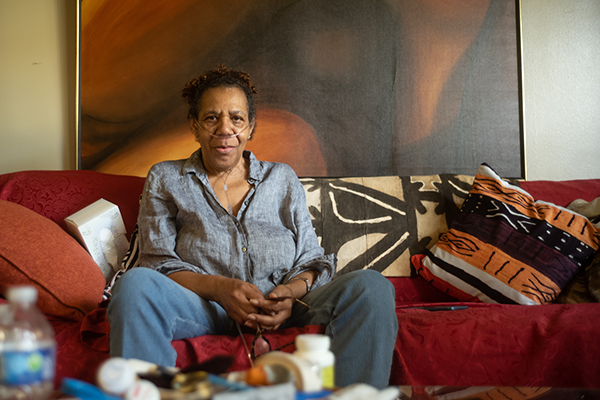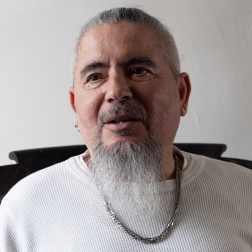
Elizabeth has been living in her Fort Greene, Brooklyn apartment for a year now. She likes the neighborhood, but she has a problem with the hills. It’s not too noticeable, but most of the sidewalks have a gentle slope to them. "If you're in good shape, it's one thing…" she says, trailing off. At 73 years old, Elizabeth isn’t in as great a shape as she’d like.
Eleven years ago, she was diagnosed with COPD — chronic obstructive pulmonary disease. It restricts the airflow to the lungs and makes it hard for Elizabeth to get the oxygen she needs. It also severely limits her mobility. "I'll be out of breath walking from here to there," she says, pointing to her small galley kitchen from where she’s seated on the couch.
When she was first diagnosed, Elizabeth was working as an administrative assistant for an investment banker on Wall Street. As her condition worsened, she was forced to retire early. She also had to leave her third-floor walk-up in Flatbush — the apartment she called home for 42 years—for senior housing. And while her new place doesn’t feel like home yet, at least this building has an elevator. Accessible accommodations like that have been a necessity since Elizabeth went on oxygen five years ago. Between her walker and oxygen tank, she would never be able to get down the stairs on her own.
Elizabeth’s one-bedroom is filled with art she’s collected over the years, in vibrant reds, oranges and muted browns. She has a framed photo her brother took of Riverside Church next to a print of Michelangelo’s "Creation of Adam" that she bought in Italy on a trip with her daughter a decade ago before COPD became debilitating. She loved it. The trip lived up to her admittedly high expectations. "I'm a New Yorker; I’ve seen it all," says Elizabeth with a wry smile. "It's hard to impress me."
She wishes she’d had more of a chance to travel. These days, Elizabeth spends most of her time inside watching TV. She used to go to weekly pulmonary rehab, but the copay became too expensive, and Elizabeth couldn’t afford it. Now, she just follows along with the exercises on her computer. However, she admits she doesn’t do them as often as she should. "The day just goes," she says. "I don’t even know where the time goes."
Even stirring a pot is too much.
For the last few years, each day has started with a knock on the door and a home-delivered meal. Elizabeth likes them, though she wishes she could still cook for herself. When she was younger, Elizabeth loved to cook, experimenting with different cuisines. One of her signature meals was eggplant creole. "Even people who didn't like eggplant would eat it," she says proudly. She still bookmarks recipes that catch her eye, though she knows she won’t be able to try them. Elizabeth simply doesn’t have the energy to stand at the kitchen counter and chop vegetables. "Even stirring a pot is too much," she says.
It’s difficult, but Elizabeth still tries to get out and stretch her legs a few times a week. Her portable oxygen means that every excursion is on a timer. Like a scuba diver making a journey underwater, Elizabeth can only be out for as long as she has air in her tank. It restricts how far she can go. "This takes a lot out of your life," says Elizabeth. But as long as she can, Elizabeth will try to go on her walks. She’s tough. She's a New Yorker, after all.



